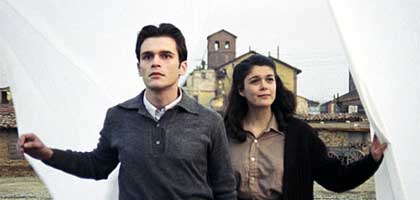
Trilogy: The Weeping Meadow
Greece/France/Italy/Germany 2004

Reviewed by Nick Roddick
Synopsis
Our synopses give away the plot in full, including surprise twists.
In 1919, Greek refugees from Odessa arrive in Greece, among them Spyros; his wife, Danae (Thalia Argyriou); their son; and a younger orphan girl called Eleni. They are given land beside a river and build a village. Some years later, Spyros is prospering but Eleni, who has become pregnant by Spyros’ son, returns after a secret birth. Her twin babies, Yorgis and Yannis, have been adopted. When Danae dies shortly afterwards, Spyros becomes obsessed with Eleni and a marriage is arranged. But Eleni flees the ceremony with Spyros’ son and, with the help of travelling musicians led by violinist Nikos, they flee to Thessaloniki.
Pursued by a vengeful Spyros, they later move to the musicians’ hang-out. Spyros’ son proves to be a gifted accordionist, but Nikos and his group find it hard to get work. Eleni and Spyros’ son, meanwhile, are reunited with Yorgis and Yannis. In 1936, aligning themselves with the Popular Front, the musicians play at a dance. Spyros appears once more, but dies of a heart attack.
The Popular Front is crushed, the fascists begin to take control, Nikos is killed and Spyros’ son accepts an offer from another band leader to tour America. Alone with her sons, Eleni is arrested for political reasons and spends the war years in jail. Freed in 1946, she learns that Spyros’ son, who joined the army to get US citizenship and so be able to send for his family, died in the final days of the war in the Pacific. Taken in by fellow villagers ashamed by how they once treated her, Eleni learns that her two sons, fighting on different sides in the civil war, are both dead. In 1949, finding Yorgis’ body in her childhood home, now a ruin in the submerged village, Eleni gives in to her grief.
Review
History has usually provided little more than script fodder for the cinema - an exciting background against which the heroics of a Pearl Harbor or a Saving Private Ryan can be played out. All the more reason, then, to celebrate the fact that veteran Greek director Theo Angelopoulos is embarking on a major new trilogy, destined to chart the history of his country from the early years of the last century to the present. Its first part, The Weeping Meadow, gives us not the recent Angelopoulos of Eternity and a Day (1998), where events are refracted through the experience of a single individual, but a return to the vast, sweeping tableaux of Days of 36 (1972) and The Travelling Players (1975), in which there is no room for individual destiny, let alone heroics.
Angelopoulos has denied that he is a pessimist, preferring the word ‘melancholy’. But there is little here to counter the notion of an implacable history crushing all in its path and leaving the individual with, at best, the possibility of adjusting to forces beyond his or her control. True, The Trilogy is to have an individual as chief protagonist - and a woman at that, the first in an Angelopoulos film since Reconstruction (1970). But his choice of a name for her all but denies individuation: Eleni, from the root of the Greek word for Greece.
Orphaned by the Bolshevik revolution, Eleni is exiled from her new home as a result of her passion for the son of the house (echoes of Oedipus Rex), then cast adrift in an uncertain world which slowly but surely robs her of her lover, her children and her purpose in life. We are in a world similar to that of Greek tragedy here, where a single fault sets in motion a chain of events to which the central character can only react. Indeed, one of the most impressive things about The Weeping Meadow is how it superimposes the structures of classical tragedy on to the history of modern Greece. All the major events in the story - the flight from Odessa, childbirth, the experiences of Elini’s lover in the New World, the war, the deaths of her sons - are narrated rather than shown.
What we dwell on, in long, multi-layered plans-séquences masterfully filmed by Andreas Sinanos, are the moments in between, where life is lived, history having passed through and left its mark. The colour palette is almost entirely browns and greens. When red does make a brief appearance - in the women’s dresses at the Popular Front dance - it disappears almost immediately. And, on the flotilla of boats crossing the lake that recalls Days of 36, the flags are no longer red but black, in mourning. Red makes one more brief - and equally significant - appearance in the film’s single most striking image: as blood staining the ground beneath the tree from which the bodies of a flock of sheep have been hung. Similarly, while the violinist Nikos and his musicians recall the travelling players of the director’s earlier masterpiece, the group in this film has no cohesion, no future, no hope. And water - a key element in Angelopoulos’ films - is everywhere: falling from the constantly leaden skies, separating the refugees from the (unseen) metropolitan Greeks in the opening sequence, bearing home a coffin, flooding the village - and, of course, carrying Elini’s lover away to the New World where, Angelopoulos says, the trilogy will end.
At a time when such work is hard to finance, let us hope that the money will be forthcoming for parts two and three. With Satyajit Ray and Kurosawa dead and Jancso marginalised, there is quite simply no one else still doing this kind of work. The Weeping Meadow is not a film for everybody - but who says films have to be? Curiously dismissed as a ‘minor work’ when it debuted in Berlin in February, it is, in the original sense of the word, a masterpiece - that is to say, not necessarily ‘a great film’ (though I suspect it will come to be regarded as that), but the work of a master absolutely sure about what he wants to do, and fully capable of achieving it.
Credits
- Producers
- Theo Angelopoulos
Phoebe Economopoulos - Original Idea/Script
- Theo Angelopoulos
- Director of Photography
- Andreas Sinanos
- Editor
- Giorgos Triantafyllou
- Art Directors
- Giorgos Patsas
Costas Dimitriadis
